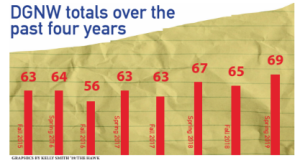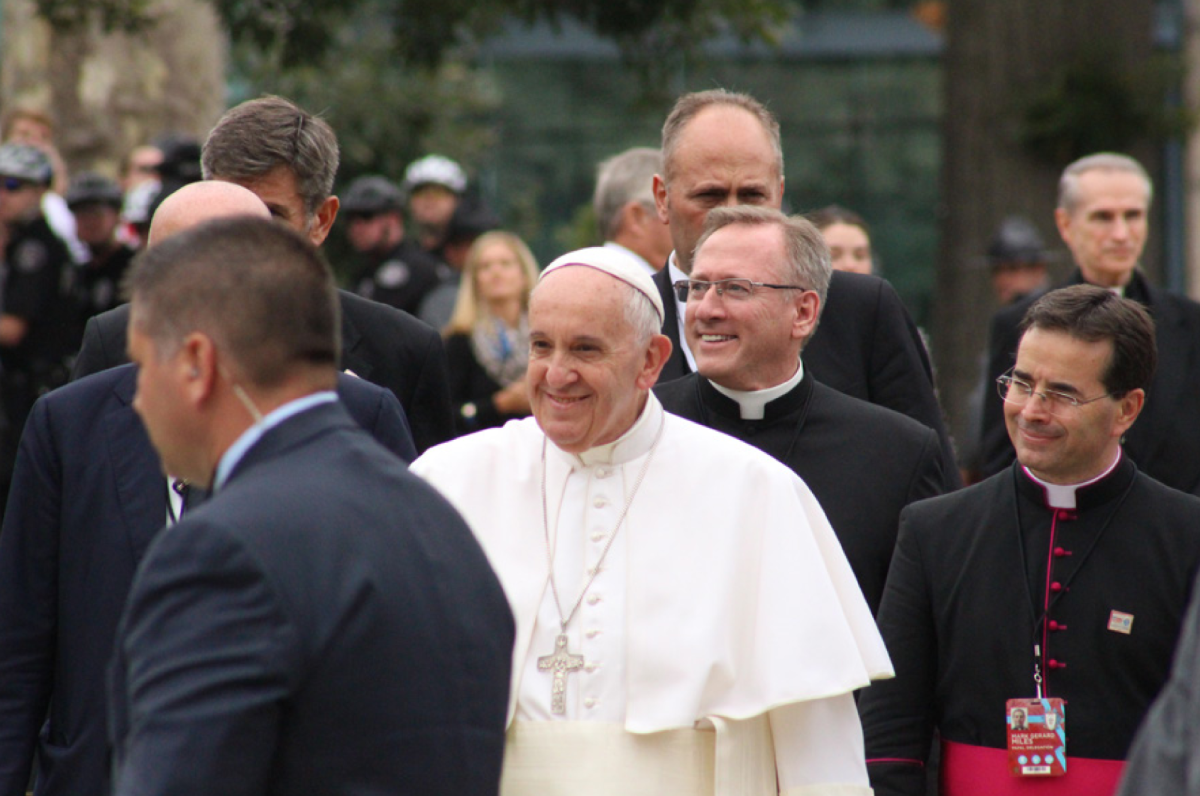Ana Faguy ’19 co-wrote this article.
Four faculty-led working groups have been meeting all semester to discuss ways to address climate diversity issues on campus.
Faculty Senate President Ron Dufresne, Ph.D., associate professor of management, said these discussions were prompted by the results of the Climate Study and the reported incidents of racism in the fall 2018 semester.
Part of this faculty conversation has involved the current structure of diversity requirements at St. Joe’s.
All undergraduate students are required to complete three courses called “overlays.” The three overlays—writing-intensive, ethics-intensive and diversity/globalization/non-western area studies (DGNW)—can be satisfied by major courses, elective courses or General Education Program (GEP) courses. Courses receive overlay status after going through a faculty committee certification process.
“Questioning how might our curriculum better contribute to a more just, diverse and inclusive climate is something that is important for us as faculty to really take the lead in considering,” Dufresne said.

At a January special meeting of the faculty senate, where the four working groups were created, faculty discussed the effectiveness of the DGNW overlay for students and looked at possible recommendations for changes to the existing requirement.
“It’s important that students learn diversity on its own, but what happens with the present cycle is that students have a choice,” said Brian Yates, Ph.D., secretary of the faculty senate and assistant professor of history, who participated in one of the working groups. “To me, I believe it’s something that should be a part of every student’s experience. We need to prepare our students for what they’re going to get once they leave St. Joe’s, and I feel when you bundle all three together you’re not adequately preparing students for the world they live in.”
Another issue faculty considered is that students are not required to take a course in all three components of the DGNW. So, for example, a student might take a course in non-western area studies but not one in diversity or globalization.
Elaine Shenk, Ph.D., vice president of the faculty senate and associate professor of modern and classical languages, said students need to take courses specifically about diversity. Shenk’s working group has been discussing the development of a separate diversity course in addition to the DGNW overlay.
“A lot of students are never taking a diversity course,” Shenk said. “Globalization is very different than diversity. Those fit into the same overlay, but they don’t meet the same goals, the same objectives of getting students to recognize how to appreciate diverse perspectives.”
Although there are three separate components in the overlay, James Boettcher, chair of the philosophy department who was involved in the original implementation of the GEP, said he wanted to provide a variety of course options for students to take to fulfill the DGNW.
“More important than the total number of courses would be the extent to which students are taking multiple courses,” Boettcher said. “One of the hopes that was expressed in the early part of GEP implementation was that we could have so many diversity courses, or a sufficient number of them, that students will always take more than one.”
Shenk and Susan Clampet-Lundquist, Ph.D., associate professor of sociology, both stressed the importance of educating students early in their college careers. The overlay, as it presently exists, allows students the option to wait until their senior year to complete the requirement. This worries both Shenk and Clampet-Lundquist.
“Many students are coming into St. Joe’s already thinking about these things, but some of them aren’t,” Clampet-Lundquist said. “How do we make it so that students have this foundation their very first year? The first year seminar seems like a pretty good vehicle to do that in.”
Faith Kenville ’19, a finance major, said she waited until her senior year to take a course to fulfill the requirement so she could focus on courses for her major.
“A lot of people in CAS might be more excited to take classes like that, but most people in the business school are annoyed that they have to take classes like that,” Kenville said. “Why do I have to do this? What does this have to do with my major?”
The small working groups have been discussing a variety of options all semester for proceeding with changes to the diversity curriculum.
Clampet-Lundquist’s faculty senate working group is developing a mandate to propose the creation of a four-credit First Year Seminar program. The group’s idea is to have students take a diversity-based course with an additional hour each week, similar to a lab.
Currently, students complete the First Year Seminar requirement through any pre-approved three-credit course in disciplines across the university. There is no mandated diversity component attached to these courses.
Dufresne said any proposed mandates must go through the full governance process before any updates can be made to the curriculum. That process involves several layers of review before going to the faculty senate for a vote.
While Dufresne said he hopes for changes to be complete in the next academic year, he cautions against rushing into the process.
“I would never want to rush anything through the governance process for the sake of getting it done, because that would run a real risk of potentially not making the best decision, so with the dual intentions to be as robust and high quality decision makers as possible and as quickly as possible,” Dufresne said.
Funding for any proposed changes also remains an unknown.
“Do we prioritize money towards purchasing property, or do we prioritize money going towards developing students that are with and for others?” Clampet-Lundquist said.
Yates argued that deciding and subsequently funding diversity curriculum changes will make a larger statement about the institution’s attitude towards diversity.
“We are going to find out where the administration’s values are,” Yates said. “If you’re committed to diversity, you’re going to fund it. If you’re not committed, then you’re not going to fund it.”
Yates said regardless of the funding questions, the university needs to prioritize the teaching of diversity.
“There’s obviously a problem on campus, and these racist incidents aren’t isolated, they’re symptoms of a disease of St. Joe’s culture,” Yates said. “We’re trying our best on our side, on the faculty side and curriculum side to say at the very least you will know what you’re doing when you do something racist.”







































